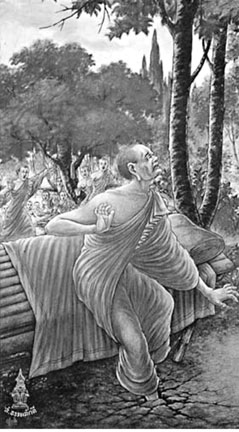Devadatta turns the most persistent Buddha's enemy
By Premasara EPASINGHE
“For a virtuous person, it is easy to do good deeds, but for an evil
one, it is easy to do evil and difficult to do good deeds. For example
in life, it is always easy to do certain things which are not
beneficial, but it is very difficult to do beneficial deeds”.
These sentiments were expressed by the Blessed One, relating to the
schism in the Sangha, caused by Devadatta Thera.
The Buddha, while sojourning at the Veluvana Monastery uttered the
verse given below, with reference to Devadatta who committed the grave
offence of causing a rift or schism in the Order of the Bhikkhus.
 Sukarahi Asadhumi Sukarahi Asadhumi
Attano Ahitani Ca
Yain Ve Hitain Ca-Sadhuin Ca
Tain Ve Paramadukkaram
- Atta Vagga – the self – Dhammapada Verse (163)
(Easy it is to do things which are bad and harmful to oneself. That
which is beneficial and good to oneself. It is indeed hard to perform.)
Close relation
One day, when the Buddha was addressing the Bhikkhus at the Veluwana
Monastery, Devadatta suggested that since the Buddha was getting old,
the duties of the Sangha should be entrusted to him. Although, Devadatta
was a close relation of the Buddha, his request was turned down.
Devadatta disliked the Buddha not only in the present, but also in
his entire Samsaric journey. He was so vicious, that he planned to kill
the Buddha, hurling a big stone from Gijjakuta Pabbata and sending an
intoxicated elephant Nalagiri. No one could hurt the Samma Sambuddha. He
tried to kill Him thrice and failed miserably.
Devadatta tried his latest tactics to disintegrate the Sasana. To be
a hero for the Sangha, he proposed “Five rules of discipline” among the
Bhikkhus to observe throughout their lives. Devadatta's proposals were:
1. Bhikkhus should live in forests.
2. They should live only on food received from alms-rounds or
“Pindapatha”
3. They should wear robes made only from pieces of cloth collected from
cemeteries.
4. They should reside under trees.
5. They should not eat fish or meat.
No objections
The Enlightened One, did not have any objections to the rules and
also made no objection to those who were willing to observe them.
However, the Buddha never agreed to impose them as a rules of discipline
on Sangha.
Thus, the rift began. With some new Bhikkhus, the “Breakaway Group”
began to support Devadatta. They left the Veluvana Monastery and created
a schism in a religious organisation over the doctrine in which one
group refusing to recognise the authority of the other.
The Buddha warned him stating that it was a grave sin. Devadatta paid
no heed to the Buddha's warning. When Devadatta met Ven. Ananda,
“Attendant of the Buddha”, he informed Ananda that he would observe
“Uposatha” - a day to perform duties.
Similar to the “Sabbath” - a word in the Christian religion, a day of
the week intended for rest and worship of God, Saturday for Jews and
Sunday for Christians. Ven. Ananda told the Buddha about Devadatta's
mission. The Buddha said, “Ananda, he is committing a very grave and
serious sin. It will send him to Avichi Niraya, the worst hell as far as
suffering is concerned.
Devadatta, a cousin of the Buddha was His most persistent enemy.
According to Mahamaya canon, particularly the “Lotus Sutra’, Devadatta
was considered a Bodhisatva in a disguise who through his constant
“Needling” of the Buddha helped the latter perfect His Enlightenment.
Thus, Devadatta was known as a good spiritual advisor.
Compassion
The Buddha was full of compassion, absolutely pure in motive
perfectly selflessness in His service to humanity. Yet, in preaching and
spreading His teaching, the Buddha faced many opposition. He was
severely criticised, abused and insulted. His chief opponents were the
teachers of rival sects and followers of heretical schools and sects,
whose traditional teachings and superstitious rites and ceremonies were
criticised. The Buddha's greatest enemy was his own brother-in-law and
erstwhile disciple Devadatta. Even in the Jataka tales, the character of
Devadatta was depicted as a ruthless person.
Devadatta, hailed from a royal family like the Buddha. He was the son
of King Suppabuddha and Pamita, an aunt of the Buddha. Yasodhara was his
sister. According to the Buddhist literature he was thus a cousin and
brother-in-law of the Blessed One. He entered the Sasana, in the early
part of the Buddha's Order with Ananda and other Sakyan Princes.
Although, he was a close relation of the Buddha, he never had any
favour. The Buddha treated all of them equally.
Devadatta was a shrewd person. He was very close to King Ajasatta. On
his advice, Ajasatta killed his father Bimbisara. Ajasatta became one of
the chief supporters of Devadatta and he built a monastery for him.
Although, he lived in the same monastery with the Blessed One,
Devadatta could not attain any stages of Sainthood or attain the bliss
of Nibbana. However, Devadatta was distinguished for worldly psychic
powers.
|


